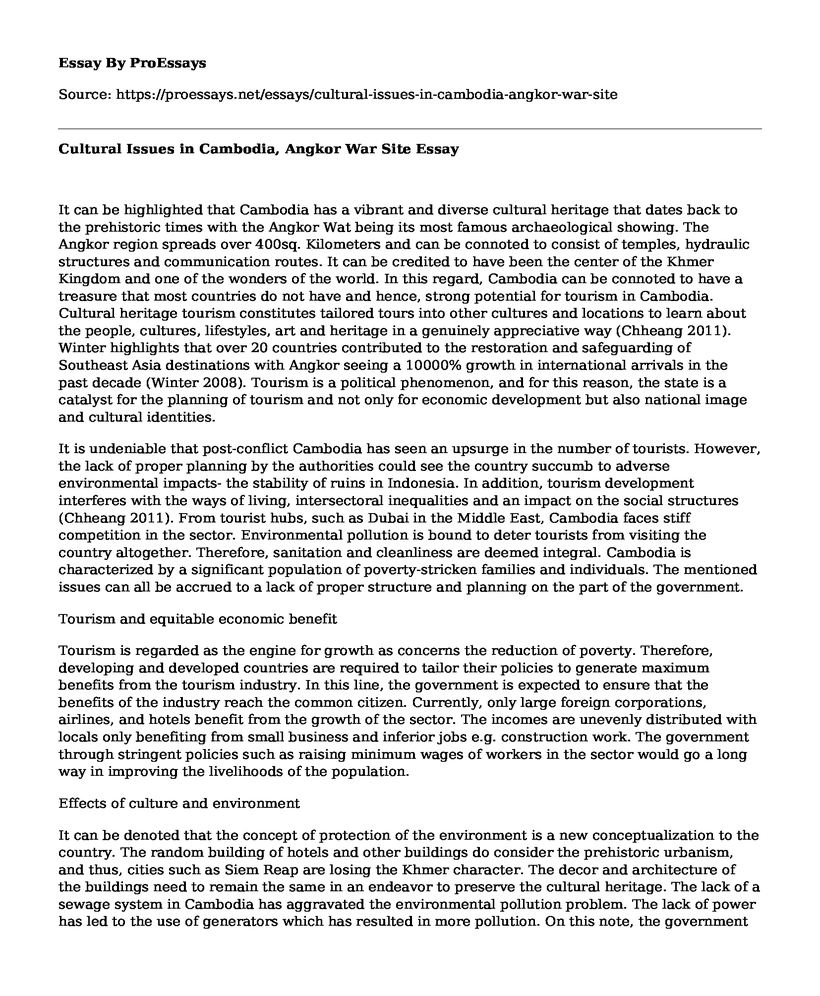It can be highlighted that Cambodia has a vibrant and diverse cultural heritage that dates back to the prehistoric times with the Angkor Wat being its most famous archaeological showing. The Angkor region spreads over 400sq. Kilometers and can be connoted to consist of temples, hydraulic structures and communication routes. It can be credited to have been the center of the Khmer Kingdom and one of the wonders of the world. In this regard, Cambodia can be connoted to have a treasure that most countries do not have and hence, strong potential for tourism in Cambodia. Cultural heritage tourism constitutes tailored tours into other cultures and locations to learn about the people, cultures, lifestyles, art and heritage in a genuinely appreciative way (Chheang 2011). Winter highlights that over 20 countries contributed to the restoration and safeguarding of Southeast Asia destinations with Angkor seeing a 10000% growth in international arrivals in the past decade (Winter 2008). Tourism is a political phenomenon, and for this reason, the state is a catalyst for the planning of tourism and not only for economic development but also national image and cultural identities.
It is undeniable that post-conflict Cambodia has seen an upsurge in the number of tourists. However, the lack of proper planning by the authorities could see the country succumb to adverse environmental impacts- the stability of ruins in Indonesia. In addition, tourism development interferes with the ways of living, intersectoral inequalities and an impact on the social structures (Chheang 2011). From tourist hubs, such as Dubai in the Middle East, Cambodia faces stiff competition in the sector. Environmental pollution is bound to deter tourists from visiting the country altogether. Therefore, sanitation and cleanliness are deemed integral. Cambodia is characterized by a significant population of poverty-stricken families and individuals. The mentioned issues can all be accrued to a lack of proper structure and planning on the part of the government.
Tourism and equitable economic benefit
Tourism is regarded as the engine for growth as concerns the reduction of poverty. Therefore, developing and developed countries are required to tailor their policies to generate maximum benefits from the tourism industry. In this line, the government is expected to ensure that the benefits of the industry reach the common citizen. Currently, only large foreign corporations, airlines, and hotels benefit from the growth of the sector. The incomes are unevenly distributed with locals only benefiting from small business and inferior jobs e.g. construction work. The government through stringent policies such as raising minimum wages of workers in the sector would go a long way in improving the livelihoods of the population.
Effects of culture and environment
It can be denoted that the concept of protection of the environment is a new conceptualization to the country. The random building of hotels and other buildings do consider the prehistoric urbanism, and thus, cities such as Siem Reap are losing the Khmer character. The decor and architecture of the buildings need to remain the same in an endeavor to preserve the cultural heritage. The lack of a sewage system in Cambodia has aggravated the environmental pollution problem. The lack of power has led to the use of generators which has resulted in more pollution. On this note, the government needs to seek both financial and technical assistance to mitigate the mentioned problems.
Effects on social life
The upsurge of the tourism industry has led to the alleviation of entertainment centers such as nightclubs and as consequence, alleviation of the sex trade industry.
In conclusion the Angkor Wat Site can be made more beneficial to the community through culture and economic benefit by implementation of a sound plan and policies.
References
Chheang, Vannarith. 2011. "Angkor heritage tourism and tourist perceptions." Tourismos: An International Multidisciplinary Journal of Tourism 1-29.
Sharp, Robert. 2008. Heritage site in peril: Angkor Wat is falling down. March 14. Accessed December 5, 2016. http://www.independent.co.uk/news/world/asia/heritage-site-in-peril-angkor-wat-is-falling-down-795747.html.
Sofield, Thomas. 2009. "Post-colonial heritage, post-colonial tourism: culture, politics and development at Angkor." Journal of Heritage Tourism 347-351.
UNESCO. 2016. Angkor. Accessed December 5, 2016. http://whc.unesco.org/en/list/668.
Winter, Tim. 2008. "Postconflict Heritage and Tourism in Cambodia: The Burden of Angkor." International Journal of Heritage Studies 524-539.
Cite this page
Cultural Issues in Cambodia, Angkor War Site. (2021, Mar 29). Retrieved from https://proessays.net/essays/cultural-issues-in-cambodia-angkor-war-site
If you are the original author of this essay and no longer wish to have it published on the ProEssays website, please click below to request its removal:
- Research Paper on Ecotourism
- Edo Period in Japan Essay Example
- Unequal Childhoods Interview Paper Example
- Article Analysis Essay on Hegemony of Homogeneity: Unpacking Japan's Culture & Impact
- Essay Sample on Ain't I a Diva?: Exploring Beyonce's Phenomenon & Cultural Impact
- Cultural Awareness at American River College
- Essay Sample on My Life as a Zucchini: The Journey of Icare After Losing His Mom







